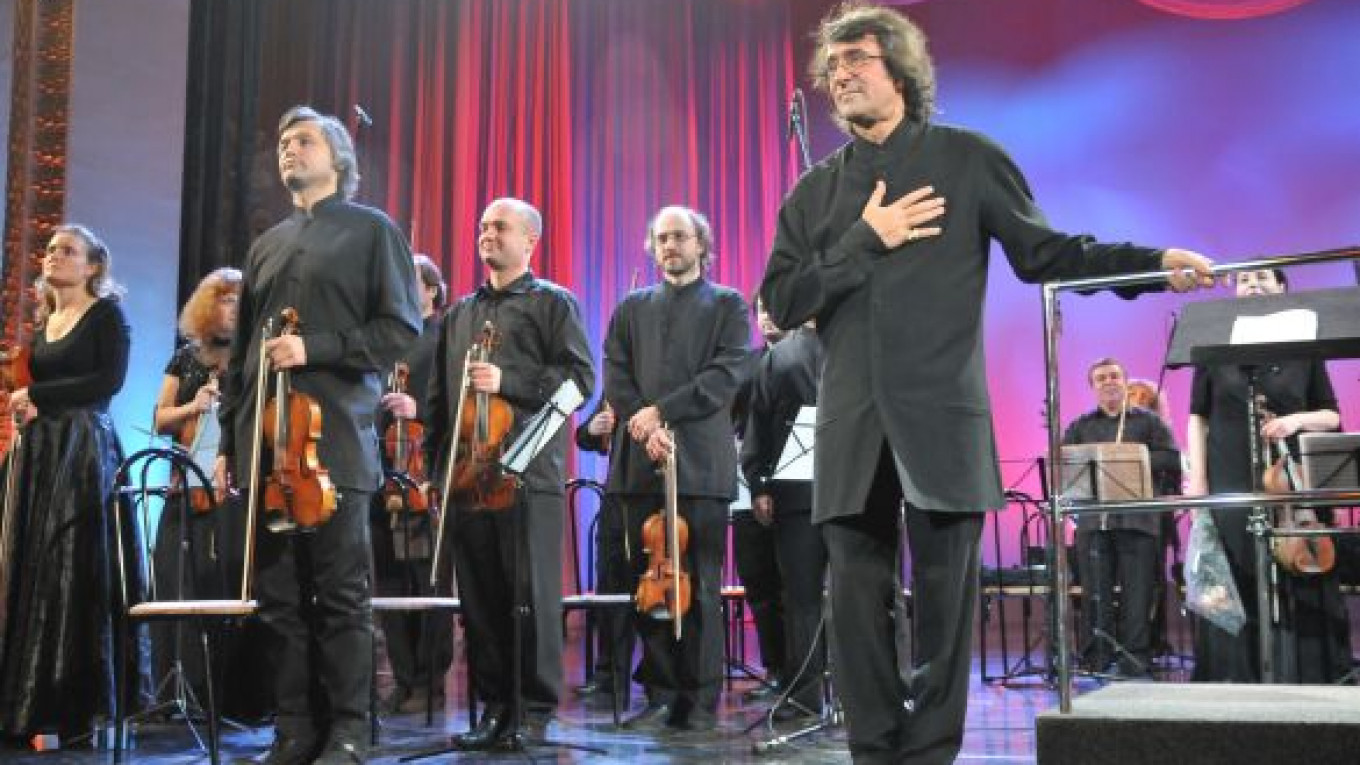Culture doesn’t automatically spring to mind when you think of Sochi these days. But along with its massive preparations for the 2014 Winter Olympic Games and its plans for building a Formula One track, the Black Sea resort city is also playing host to a far-reaching program of events dubbed the “Cultural Olympics.”
Among those events is the International Winter Festival of the Arts in Sochi, under the artistic direction of celebrated violist and conductor Yury Bashmet, which is due to play there next February for the fifth year in row.
Last Monday, Bashmet brought the festival to Moscow in the form of a highly unusual concert at Tchaikovsky Hall that mixed classical music, mostly in bits and pieces, with pop and poetry. Films and a close-up look at the proceedings on stage were projected onto a huge screen at the rear, while out in the lobby concertgoers were treated to a reprise of last February’s festival exhibit of video art. Though definitely not for purists, the evening nevertheless proved a remarkably enjoyable experience and quite possibly a good advertisement for Sochi as something more than simply a sports and vacation mecca.
On its classical side, the high point of the concert was without doubt the rare Moscow appearance by violinist Vadim Repin, who brought melting tone and his usual, superbly disciplined playing to the last two movements of Felix Mendelssohn’s seldom-heard early Violin Concerto in D minor. But not far behind him was Bashmet, who turned his viola for a lovely adagio, with string orchestra accompaniment, by Johannes Brahms. Also among the classical works were excerpts from Camille Saint-Saens’ “The Carnival of the Animals.” When “Carnival” reached its “Swan” episode, Bashmet again picked up his viola to play the solo part, as ballerina Tatyana Chernobrovkina, pride of the Stanislavsky and Nemirovich-Danchenko Musical Theater, danced the familiar “Dying Swan” on a raised platform at side of the stage.
As for pop, there were rousing performances by singers Pelagia and Nino Katamadze, together with their respective backing groups. And for poetry came a brief and very touching recitation of her own works by Vera Polozkova.
Last winter’s festival in Sochi took place over nine mostly rain-soaked days in February and included, besides music, a retrospective of films by Spanish director Carlos Saura, video art seen here on Monday and an exhibition of jewelry. The venue for it all was the city’s Winter Theater, a grandly conceived structure built in 1937 on a square overlooking the Black Sea in what has come to be known as Stalinist Empire style.
Musically, what I experienced of it over the festival’s first six days had its ups and downs, the principal ups being a pair of concerts that rivaled the very best to be heard this season in Moscow.
World-renowned Mariinsky Theater director and chief conductor Valery Gergiev had twice before promised to take part in the festival, but failed to show up. Somewhat to the organizers’ surprise, he arrived this time just a few hours before his scheduled concert with Bashmet’s Novaya Rossiya Symphony Orchestra — and no doubt, according to certain malicious tongues, due to his realizing that the time had come to get his hands on a piece of the Cultural Olympics.
At least as surprising as his arrival was the concert he produced, following no more than a 90-minute rehearsal. Under Gergiev’s baton, the orchestra rose to a level of playing the equal of any to be heard from a Moscow orchestra, first in Alfred Schnittke’s Viola Concerto, with Bashmet giving his usual heartfelt account of the solo part, and then in Sergei Rachmaninov’s sprawling Symphony No. 2, when, for the first time ever, I found myself having no inclination to use it as the excuse for a nap. The result was nearly enough to forgive the maestro the often under-rehearsed and superficial-sounding performances he has led with his own Mariinsky Orchestra at the Easter Festival and otherwise in Moscow.
The second high point of my concert-going in Sochi was a sublime hour and a quarter of improvisations on the music of Johann Sebastian Bach by the veteran French pianist Jacques Loussier and his bass-and-drums trio. Loussier has long been a master of applying jazz to the classics, and it was apparent that even at 76 he had not lost a bit of his touch. Unfortunately, for all who admire his art, the pianist is soon due to disband the trio and retire from the concert stage.
Among the rest that made the trip to Sochi worthwhile was the rare opportunity, at the opening concert, to hear a pipa, an ancient Chinese string instrument, played in this case with delicacy and dexterity by one of its leading exponents, a young lady named Wu Man, in a concerto by China’s best-known contemporary composer, Tan Dun.
A Message from The Moscow Times:
Dear readers,
We are facing unprecedented challenges. Russia's Prosecutor General's Office has designated The Moscow Times as an "undesirable" organization, criminalizing our work and putting our staff at risk of prosecution. This follows our earlier unjust labeling as a "foreign agent."
These actions are direct attempts to silence independent journalism in Russia. The authorities claim our work "discredits the decisions of the Russian leadership." We see things differently: we strive to provide accurate, unbiased reporting on Russia.
We, the journalists of The Moscow Times, refuse to be silenced. But to continue our work, we need your help.
Your support, no matter how small, makes a world of difference. If you can, please support us monthly starting from just $2. It's quick to set up, and every contribution makes a significant impact.
By supporting The Moscow Times, you're defending open, independent journalism in the face of repression. Thank you for standing with us.
Remind me later.






